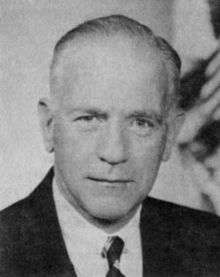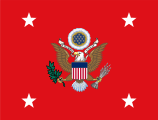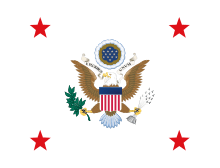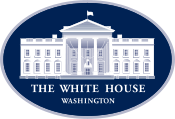Gordon Gray (politician)
| Gordon Gray | |
|---|---|
 | |
| National Security Advisor | |
|
In office June 24, 1958 – January 13, 1961 | |
| President | Dwight Eisenhower |
| Preceded by | Robert Cutler |
| Succeeded by | Mac Bundy |
| Director of the Office of Defense Mobilization | |
|
In office March 14, 1957 – June 24, 1958 | |
| President | Dwight Eisenhower |
| Preceded by | Arthur Flemming |
| Succeeded by | Position abolished |
| Assistant Secretary of Defense for International Security Affairs | |
|
In office July 14, 1955 – February 27, 1957 | |
| President | Dwight Eisenhower |
| Preceded by | Struve Hensel |
| Succeeded by | Mansfield Sprague |
| President of the University of North Carolina System | |
|
In office October 12, 1950 – June 10, 1955 | |
| Preceded by | Frank Graham |
| Succeeded by | Bill Friday |
| United States Secretary of the Army | |
|
In office April 28, 1949 – April 12, 1950 | |
| President | Harry Truman |
| Preceded by | Kenneth Royall |
| Succeeded by | Frank Pace |
| Personal details | |
| Born |
May 30, 1909 Baltimore, Maryland, U.S. |
| Died |
November 26, 1982 (aged 73) Washington, D.C., U.S. |
| Political party | Republican |
| Spouse(s) |
Jane Boyden Craige Nancy Maguire Beebe |
| Children |
Gordon (with Craige) Burton (with Craige) Boyden (with Craige) Bernard (with Craige) |
| Alma mater |
Woodberry Forest School, University of North Carolina, Chapel Hill Yale University |
Gordon Gray (May 30, 1909 – November 26, 1982) was an official in the government of the United States during the administrations of Harry Truman (1945–53) and Dwight Eisenhower (1953–61) associated with defense and national security.
Biography
Family
Gordon Gray was born in Baltimore, Maryland, the son of Bowman Gray, Sr. and Nathalie Lyons Gray. He was married in 1938 to the former Jane Boyden Craige, and they had four sons: Gordon Gray, Jr., Burton C. Gray, C. Boyden Gray and Bernard Gray. After Jane's death, Gray married the former Nancy Maguire Beebe. His father Bowman, his uncle James A. Gray, Jr. and later his brother, Bowman Gray, Jr., were all heads of R.J. Reynolds Tobacco Company.
His son, C. Boyden Gray, a graduate of Harvard and the University of North Carolina Law School, served as White House counsel for President George Herbert Walker Bush. His nephew, Lyons Gray, also a graduate of both North Carolina and Yale, is chief financial officer for the Environmental Protection Agency
Education
Gordon Gray attended Woodberry Forest School for high school. He graduated from the University of North Carolina in 1930, where he was a member of Delta Kappa Epsilon fraternity (Beta chapter) & the secretive, Order of Gimghoul. He earned his law degree from Yale Law School in 1933 and practiced law for two years in New York City before returning to Winston-Salem. UNC presented Gray with an honorary law degree in 1949.
Public career
Gray began his public life as a lawyer and was elected to the North Carolina General Assembly in 1939, 1941, and 1947, representing Forsyth County. He entered the U.S. Army in 1942 as a private and rose to captain, serving in Europe with General Omar Bradley's forces. Gray's service to the federal government began with his appointment as President Harry S. Truman's assistant secretary of the army in 1947; two years later, he was appointed Secretary of the Army. He served in this post from 1949 until 1950. The following year he became director of the newly formed Psychological Strategy Board which planned for and coordinated government psychological operations; he remained in the post until May 1952, all the while continuing to lead the University of North Carolina.[1]
He was the second president of the Consolidated University of North Carolina, succeeding Frank Porter Graham in 1950.
In 1954 Gray chaired a committee appointed by AEC chairman Lewis Strauss which recommended revoking Robert Oppenheimer's security clearance. The Gray Board, as it was known, issued its split decision on May 27, 1954, with Gray and Thomas A. Morgan recommending the revocation, despite their finding that Oppenheimer was a "loyal citizen." Dr. Ward V. Evans, a conservative Republican and the third member of the board, dissented, saying that most of the allegations against Oppenheimer had been heard before, in 1947, when he had originally received his clearance.[2] In the book American Prometheus: The Triumph and Tragedy of J. Robert Oppenheimer the chairmanship of Gray during the hearings was described as severely lacking. Gray had allowed that the prosecutors briefed the committee for a full week without representatives from the defendants being present. Moreover, Gray let the prosecutors use documents and testimonies that the defendants attorneys were denied access to, as well as material that was obtained by illegal means such as unwarranted wiretaps. The authors called the Gray Board a "veritable kangaroo court in which the head jugde accepted the prosecutors lead".
Gray shocked proponents of public education in North Carolina when he said, in a November 1954 Founder's Day speech at Guilford College, that "if I had to make a choice between a complete system of publicly supported higher education or a complete system of private higher education, I would choose the latter as a greater safeguard of the things for which we live."[3] Less than a year later, Secretary of Defense Charles Erwin Wilson named Gray assistant secretary for international security affairs and Gray's brief career in academia was ended.
President Dwight D. Eisenhower appointed him to head the Office of Defense Mobilization in 1957, where he served until the office's consolidation in 1958. Eisenhower then appointed Gray his National Security Advisor from 1958 until 1961. On January 18, 1961, President Eisenhower awarded Gray the Presidential Medal of Freedom. He served on the President's Foreign Intelligence Advisory Board under Presidents John F. Kennedy, Lyndon B. Johnson, Richard M. Nixon and Gerald R. Ford. In 1976, he was awarded the United States Military Academy's Sylvanus Thayer Award.
In controversial leaked documents, Gray is alleged to have been part of the secret Majestic 12 organization.
Gray was also publisher of the Winston-Salem Journal, chairman of the board of Piedmont Publishing Company and chairman of the National Trust for Historic Preservation.
References
- ↑ "Staff Member and Office Files: Psychological Strategy Board Files". Harry S. Truman Presidential Library.
- ↑ Crow, Jeffrey J. (April 2008). "'The Paradox and the Dilemma': Gordon Gray and the J. Robert Oppenheimer Security Clearance Hearing". North Carolina Historical Review. 85 (2): 163–190. JSTOR 23523398.
- ↑ quoted in Crow, p. 188
External links
- Inventory of the Office of President of the University of North Carolina (System): Gordon Gray Records, 1950-1955, in the University Archives, UNC-Chapel Hill.
- Papers of Gordon Gray, Dwight D. Eisenhower Presidential Library
- Records of the White House Office of the Special Assistant for National Security Affairs, Dwight D. Eisenhower Presidential Library
- Undersecretary of the Army biography
- Gordan Gray biography in Secretaries of War and Secretaries of the Army, United States Army Center of Military History.
- The American Presidency Project
- Gordon Gray Photograph Collection United States Army Heritage and Education Center, Carlisle, Pennsylvania
| Political offices | ||
|---|---|---|
| New office | Assistant Secretary of the Army 1947–1948 |
Succeeded by Tracy Voorhees |
| Preceded by William Draper |
United States Under Secretary of the Army 1949 | |
| Preceded by Kenneth Royall |
United States Secretary of the Army 1949–1950 |
Succeeded by Frank Pace |
| Preceded by Struve Hensel |
Assistant Secretary of Defense for International Security Affairs 1955–1957 |
Succeeded by Mansfield Sprague |
| Preceded by Arthur Flemming |
Director of the Office of Defense Mobilization 1957–1958 |
Position abolished |
| Preceded by Robert Cutler |
National Security Advisor 1958–1961 |
Succeeded by Mac Bundy |
| Academic offices | ||
| Preceded by Frank Graham |
President of the University of North Carolina System 1950–1955 |
Succeeded by Bill Friday |


